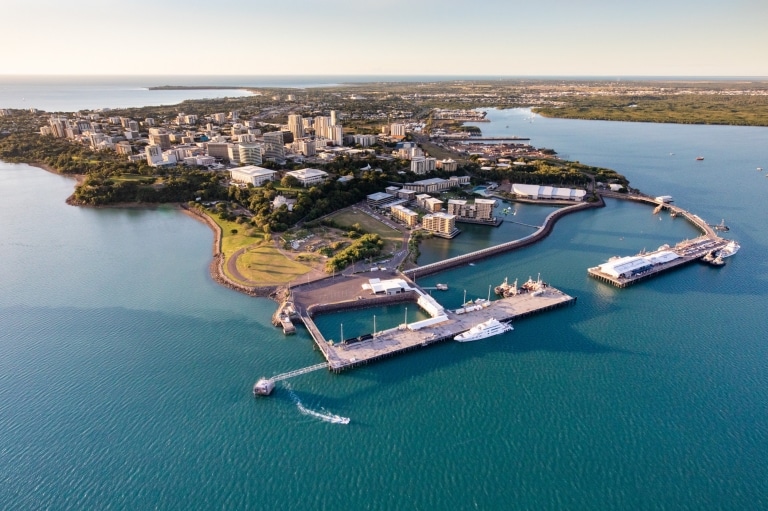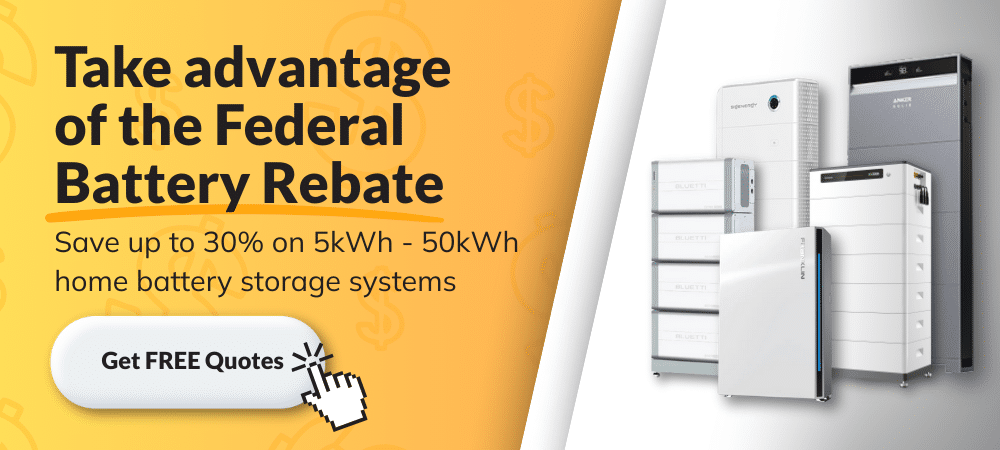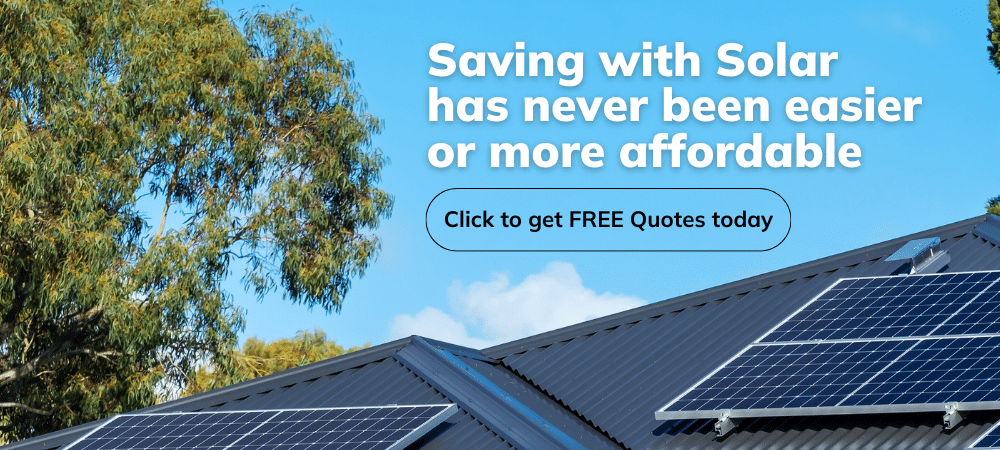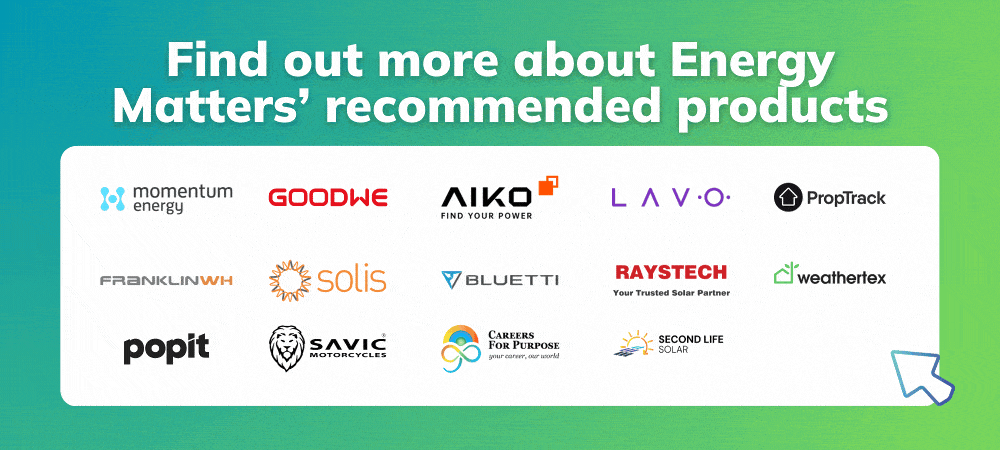Over 136 small-scale solar systems have been installed in Darwin, Northern Territory (NT) with a collective capacity of 4,054 kW. Roughly, 0.17% of homes have solar panels installed. While this number may seem modest, the potential for growth in solar energy adoption is significant, especially given Darwin’s high levels of sunlight year-round. As solar technology advances and incentives increase, the installation of solar systems in homes and businesses across the region is expected to rise, contributing to greater energy independence and sustainability.

On this page
Darwin solar statistics
Darwin boasts ideal sun exposure for fantastic solar output throughout the year. Let’s take a look at some of the important factors that impact solar production in Darwin.
| Month | Average Solar Hours (Peak Sun Hours) | Average High Temp (°C) | Average Low Temp (°C) | Average Cloud Cover (%) |
|---|---|---|---|---|
| Jan | 6.2 | 31.2 | 25.0 | 60 |
| Feb | 5.5 | 31.1 | 25.3 | 65 |
| Mar | 6.0 | 31.4 | 25.6 | 60 |
| Apr | 7.3 | 32.6 | 25.5 | 55 |
| May | 8.0 | 31.5 | 23.5 | 50 |
| June | 8.2 | 30.1 | 21.7 | 45 |
| July | 8.7 | 29.9 | 20.1 | 40 |
| Aug | 8.9 | 30.1 | 20.6 | 40 |
| Sept | 8.6 | 31.0 | 22.0 | 45 |
| Oct | 7.9 | 32.1 | 24.0 | 50 |
| Nov | 6.7 | 32.3 | 25.3 | 55 |
| Dec | 6.2 | 31.9 | 25.3 | 60 |
Data: Climates to Travel, World Weather & Climate Information
- Average Solar Hours: Darwin experiences strong solar irradiance throughout the year, with peak solar hours averaging 8.7 hours in July, the sunniest month. The solar potential decreases slightly in the rainy season, with the lowest solar hours recorded in February at 5.5 hours per day.
- Temperature Ranges: Darwin’s climate is tropical, characterised by hot and humid conditions. Average highs hover between 29.9°C and 32.6°C year-round, with lows ranging from 20.1°C in July to 25.6°C in March. The hottest months are typically November through March.
- Cloud Cover: Cloud cover is most prevalent during the wet season (November to March), with an average of 60% cloud cover in January. During the dry season (May to October), cloud cover decreases, dropping to around 40-45%, contributing to clearer skies and more sun.
Darwin homes with a solar system
136
Darwin homes with battery storage
Unknown
Northern Territory EV ownership
Unknown
Figures updated 2024
Why Solar and Battery Storage are essential for Darwin homes and businesses
As Darwin continues to move towards renewable energy, solar power and battery storage are becoming essential for homes and businesses aiming to cut down on energy costs while contributing to sustainability efforts. With its abundant sunshine and the growing demand for energy independence, integrating solar and battery systems offers a multitude of benefits for both residential and commercial properties in the region. Here’s why these technologies are crucial for Darwin:
- Maximised Energy Efficiency: Darwin benefits from a tropical climate with over 8 hours of average daily peak sun hours in the dry season (May to October), making it an ideal location for solar energy generation. Solar systems paired with battery storage ensure energy captured during the day can be stored and used during peak demand periods, reducing the need for grid reliance.
- Cost Savings: By adopting solar power and battery storage, Darwin residents and businesses can significantly reduce their electricity bills. The cost of installing solar systems has dropped over the past few years, and with available government rebates, transitioning to solar is more affordable than ever, offering long-term savings on energy costs.
- Environmental Impact: Solar energy is a clean and renewable energy source that helps reduce carbon footprints. With increasing focus on sustainability, the integration of solar and battery storage supports Darwin’s efforts to lower greenhouse gas emissions while promoting clean energy solutions for the community.
City of Darwin suburbs
The following suburbs can enjoy the benefits of solar and battery storage. Contact your council to find out if your home has any restrictions or heritage overlays that may impact the installation of solar on your home or business.
- Alawa – 0810
- Anula – 0812
- Araluen – 0811
- Bayview – 0820
- Berrimah – 0828
- Coconut Grove – 0810
- Coolalinga – 0839
- Darwin City – 0800
- East Point – 0820
- Fannie Bay – 0820
- Holmes – 0832
- Humpty Doo – 0836
- Jingili – 0810
- Karama – 0812
- Leanyer – 0812
- Ludmilla – 0820
- Marrara – 0812
- Moil – 0810
- Nightcliff – 0810
- Parap – 0820
- Palmerston – 0830
- Rapid Creek – 0810
- Stuart Park – 0820
- Wanguri – 0810
Rebates and Incentives for Solar, Batteries, and more in Darwin
The NT Government continuously makes an effort to deliver solar rebates and incentives to its residents that encourage more people to switch to solar.
Home & Business Battery Scheme (HBBS)
HBBS allows households and businesses $6,000 grant when they buy and install solar panels with eligible batteries and inverters. Those with existing solar batteries and inverters may also get HBBS as long as the battery storage is at least 7 kWh.
Small-scale Technology Certificates (STCs)
STCs can be exchanged for cash and deducted from the overall cost of the solar system. The number of STCs varies based on the size and location of your solar system.
Feed-in Tariffs (FiTs)
Your energy retailer is the one who will provide FiTs when you export excess energy back into the grid. FiT rates are based on your energy retailer, which is why you should take the time to find the right energy retailer to ensure you get the best rates possible.
How much can I save with solar in Darwin?
In Darwin, NT, the savings from installing a solar system depend on system size, local electricity rates, and energy consumption patterns. Here’s an estimate of the potential savings for various system sizes:
5 kW System:
- Estimated annual output: Approximately 6,050 kWh.
- Savings: With an average electricity cost of around 28-32 cents per kWh, a self-consumption of 80% could save you approximately $1,700-$1,900 annually.
6.6 kW System:
- Estimated annual output: Around 8,000 kWh.
- Savings: With similar self-consumption rates, you could save between $2,240-$2,560 annually.
8 kW System:
- Estimated annual output: Roughly 9,650 kWh.
- Savings: Potential savings would be around $2,700-$3,100 per year.
10 kW System:
- Estimated annual output: About 12,100 kWh.
- Savings: With an 80% self-consumption rate, your savings could be around $3,380-$3,850 per year.
Key points to consider:
- Feed-in Tariffs: Any excess power fed back into the grid is typically compensated at rates between 3 to 12 cents per kWh, which can affect overall savings.
- Government incentives: The federal government offers incentives through Small-scale Technology Certificates (STCs), which can cover up to 30% of installation costs.
- Payback period: The average payback period for solar installations in Darwin ranges from 3.4 to 3.9 years
Energy Matters’ solar and battery installation services in Darwin
Energy Matters proudly serves Darwin by connecting homes and businesses with local and trusted installers. Our network of solar companies provides high-quality solar and battery installations, ensuring that residents and businesses can benefit from solar technology tailored to Darwin’s unique environment.
- Solar panel installation: With extensive knowledge of solar panel installation Darwin, Energy Matters connects you with installers who will provide expert consultations to identify the most effective systems, allowing customers to benefit from Darwin’s abundant sunlight and achieve maximum energy savings.
- Battery storage solutions: Offering advanced storage solutions from a range of quality manufacturers, Our installers help our customers enhance their solar installation Darwin setup with reliable backup options.
- Ongoing support and maintenance: Support and maintenance services ensure that solar system installation Darwin customers can rely on their systems year-round, optimising efficiency and performance.
- Financing options and incentives: Our network of installers offers flexible financing and guides home and business owners through local rebate options, making solar installations in Darwin accessible to more residents.
Energy Matters is here to help you find the best solar system installation company in Darwin.
Energy efficient upgrades
Saving on your energy bills goes deeper than just solar and battery storage. Upgrading your home appliances can see significant reductions in your bills and your environmental impact. Here are just some of the energy efficiency upgrades you can make in your home and business:
- Hot water system: Solar hot water systems and heat pumps
- Energy and water-efficient appliances: Dishwashers, refrigerators, washing machines, dryers, and air conditioners
- Electronics: LED lighting and smart home monitoring











































